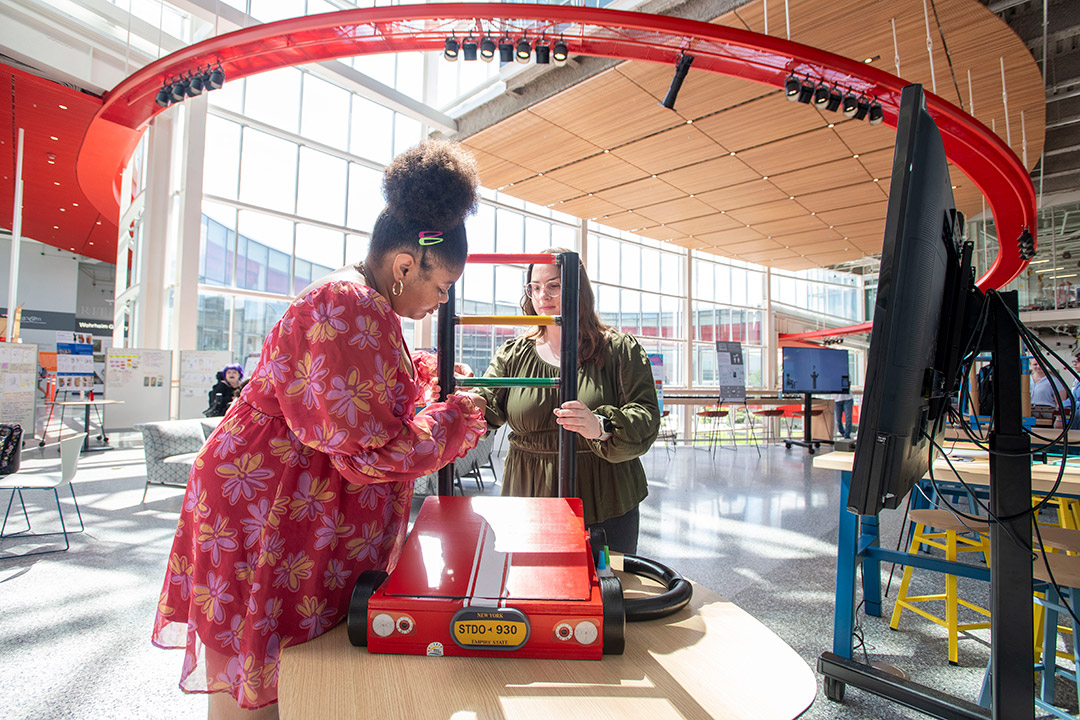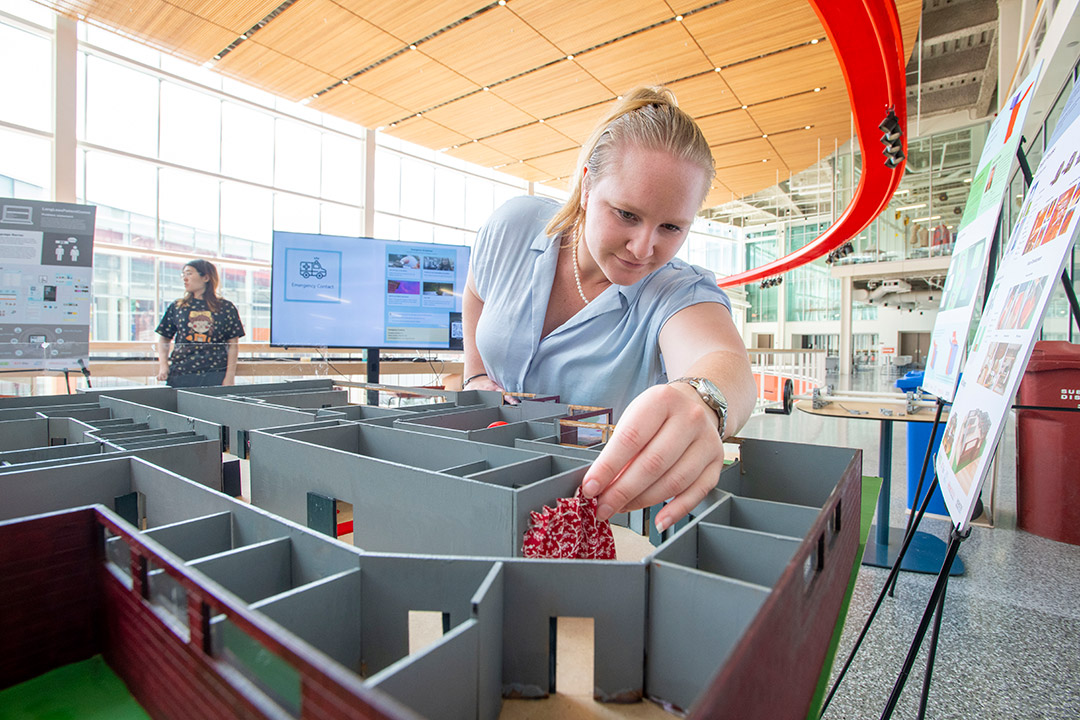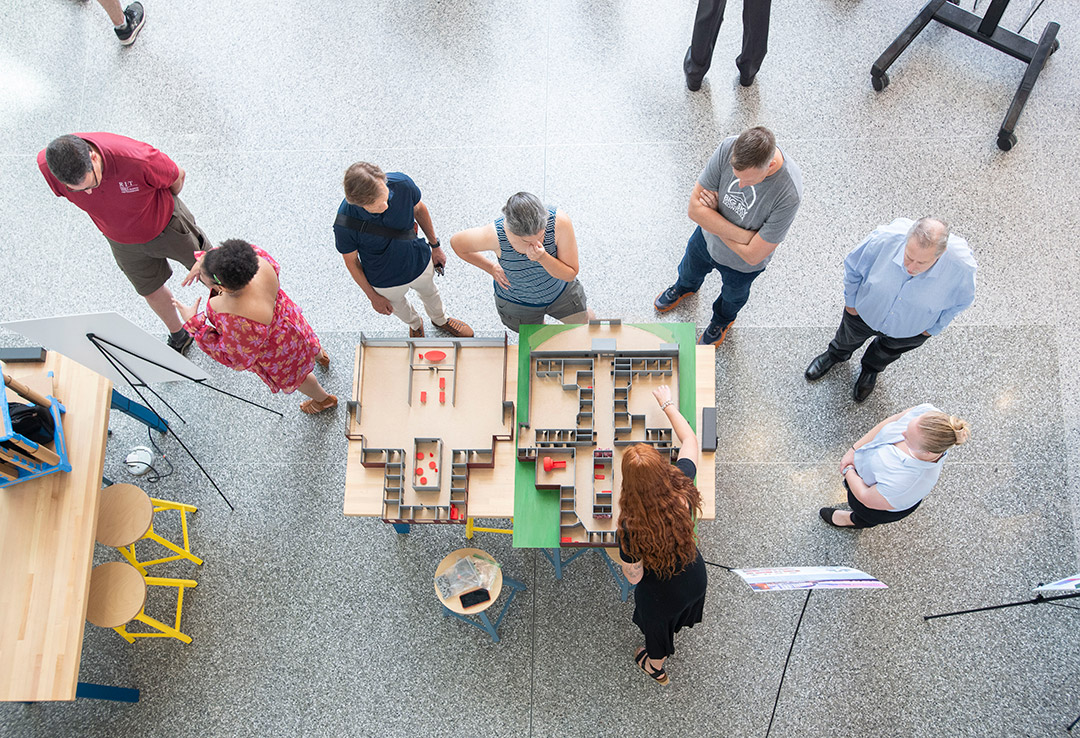Students take summer learning to the next level with Studio930 consultancy
Carlos Ortiz/RIT
RIT students Micheala Stout, left, and Katherine Berry assemble their Bubble Machine ahead of the Studio930 RIT Design Consultancy showcase on July 25. The students designed the prototype for children with developmental disabilities at Mary Cariola Center.
RIT student Micheala Stout is fulfilling her first co-op experience this summer by developing an interactive toy that fine tunes the motor skills of children with developmental disabilities. The fourth-year print and graphic media technology major joined an interdisciplinary cohort of 20 other university students to participate in the Studio930 RIT Design Consultancy, a program offered through the Simone Center for Innovation and Entrepreneurship, now in its 10th year.
The goal of Studio930 is the development of design solutions that address emerging issues facing providers of healthcare and services for individuals with special needs. Students from RIT colleges including College of Engineering Technology, Kate Gleason College of Engineering, Saunders College of Business, School of Individualized Study, College of Art and Design, and Golisano College of Computing and Information Sciences, guided by a team of highly experienced mentors including Studio930 Director and Visiting Lecturer Mariana Pinheiro, collaborated with users to make a positive impact in the community. This year, 12 projects were showcased.
When children at Mary Cariola Center in Rochester hold onto Stout’s Bubble Machine and step onto the attached platform, stimulating bubbles pour out. With the help of physical and occupational therapists, the youngsters use the machine to exercise bilateral movements and recognize their dominant hand, without aggravating noise and light sensitivities. Staff at Mary Cariola provided general guidelines for the project, but otherwise let the students’ design and creativity run wild.
Carlos Ortiz/RIT
Kayla Barrett, pictured, and her teammate Bayleigh Thurston designed the “office of the future” for their client, Rochester Regional Health. The students used the SHED’s facilities to 3D print components of the prototype.
“Studio930 gave me great insights into what it’s like to work in industry,” said Stout, from Memphis, Tenn. “I learned how to develop my skill sets, and learn new ones, work within a budget, and pivot based on the input from clients. This has been an invaluable experience.”
Stout worked alongside Daniele Loomis Rostan, an occupational therapist and certified autism specialist at Mary Cariola Center.
“The students we teach at Mary Cariola Center often have multiple and complex challenges. It is incredibly thrilling to work with a diverse group of RIT students who are eager to take on an unusual assignment and are not intimidated when confronted with these challenges,” said Loomis Rostan. “Traditional, store-bought items may not meet their unique needs or be usable by our students given their motor or cognitive skills. By collaborating with RIT students, we can work together to design and develop products that are tailored to the needs of our students. Products that are engaging, fun, and accessible. Innovations that let our kids be just that – kids.”
Dan Phillips, associate professor of electrical and microelectronic engineering, and a strong advocate of Effective Access Technology initiatives at RIT, was impressed with how well the students worked together and their strong grasp of the design process.
“From the first day of the consultancy, the students weren’t afraid to get their hands dirty,” said Phillips. “They were focused and didn’t hesitate to reach out to their clients. And they all understood the assignment – use this consultancy as a resource to help the community.”
Kayla Barrett, a biomedical engineering BS/industrial and systems engineering MS student, and Bayleigh Thurston, an industrial design MFA student, used the facilities in the SHED to build their prototype for an “office of the future” for Rochester Regional Health. The team was tasked with optimizing the space for patients and providers ahead of renovations.
“Using the SHED makerspaces was instrumental to the success of our project,” said Barrett, a Nashville, Tenn., native. “We 3D printed the components of our prototype, including little MRI machines, and laser cut others. Our design is an idealized version of what’s possible, and it can really be implemented in any setting.”
Carlos Ortiz/RIT
Twenty-one students from across RIT colleges participated in this summer’s Studio930 RIT Design Consultancy. Twelve projects were unveiled that presented design solutions to the emerging issues in the field of assistive and health technology.
Thurston, from Rochester, capitalized on the interdisciplinary nature of the consultancy and the opportunities to interact with and learn from students in other colleges. She talked through problems and leveraged their various skills and experiences.
One longstanding Studio930 client is the Al Sigl Community of Agencies.
“I am always so impressed with the student teams. Several of our programs would love to continue testing their project designs,” said Peggy Fortune, Al Sigl’s marketing director. “It’s wonderful to share these concepts and have the PTs, OTs, and other program staff help refine the designs based on real-world use. It’s also wonderful to look back at how much the designers have learned about the individuals served by our member agencies through their research over the last 10 weeks, as well as the importance of removing barriers for people of all abilities to be more fully included in the community.”
Stout’s teammate Katherine Berry, a fourth-year biomedical engineering major from Erie, Pa., most enjoyed working with a team to overcome obstacles and find the best solutions.
“I’ve learned that designing complex mechanisms and working hard to meet the needs of clients isn’t a linear path,” she said. “I hope that with small tweaks and prototype testing we will be able to provide proof of concept and place our project into the hands of the kids at Mary Cariola.”






